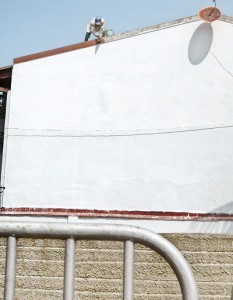News
Industrial accidents on the rise
View(s):By Kasun Warakapitiya
More than 30 people on average are admitted daily to the Colombo National Hospital due to the rising number of workplace accidents. Last year, more than 12,000 out of a total of 121,032 people admitted to the hospital had been injured in accidents at work, the National Coordinator (Training) of the Accident and Orthopaedic Service, Pushpa R. Zoysa said.
 “The most common accidents are heights-related accidents which happen at construction sites but factory-based accidents too cause serious damage and even death to labourers,” she said Falling from heights, being hit by heavy objects, electrocution, exposure to chemicals and sound are the main reasons for injuries, and all can be avoided through the use of safety gear and education.
“The most common accidents are heights-related accidents which happen at construction sites but factory-based accidents too cause serious damage and even death to labourers,” she said Falling from heights, being hit by heavy objects, electrocution, exposure to chemicals and sound are the main reasons for injuries, and all can be avoided through the use of safety gear and education.
“A high number of patents suffer from serious injuries and are maimed or face death due to injuries,” Ms Zoysa said.
She said that risk assessments of workers according to age, monthly health checks and rotating workers from high risk work should be mandatory.
The government should provide necessary equipment and act to provide safety for labourers by properly implementing the occupational health and safety regulations and aligning them with International Labour Organisation policies, she said.
A Labour Department official said the department was not informed of every accident and only received information about 3,500 cases a year.
The Commissioner of Labour Occupational Health, Dr. Wajira Palipana, said most medium and small companies that hire labourers do not inform the department if an accident happens in order to easily settle matters by paying meagre compensation and neglecting an injured labourer’s condition.
He said the department could, if notified, take legal action against such companies and make them provide compensation in line with a medical assessment, up to a maximum of Rs. 500,000. Dr, Palipana, who is also a specialist physician on occupational health, said his office was focused mainly on education rather than provision of safety gear but that the commission was working on increasing compensation provided to injured workers and planning to provide safety equipment to labourers in the future.
“Safety equipment is the last resort to reduce accidents: before that, the labourer should be aware of the task to which he is assigned and whether he is working in a safe environment,” Dr. Palipana said.
He said workers on constructon and industrial sites faced a variety of physical, chemical, biological or social health risks and needed to take precautions. Having training programmes for workers is a must, he said. They should undergo regular checkups as well as receive clear instructions and education by company managers.
On worksites, a senior official should be appointed as a safety officer to provide knowledge and supervision to others.
“Every time a worker takes sick leave the chief health officer should request a medical certificate from the labourer and send a copy to the Labour Department,” Dr. Palipana said.
He said the department had trained 600 officials in construction companies on occupational safety and visited worksites to train others. He also said that the department also provides labourers with diplomas on safety through the Construction Industry Development Authority.
The Inter Company Employees Union said it was not satisfied with the government’s labour safety actions.
The union’s leader, Wasantha Samarasinghe, said labour safety was disregarded by the private sector because labour ideals were considered unimportant.
“Companies need work but they don’t look into the family that loses a husband or the employee who was injured,” Mr. Samarasinghe said. He said while the Department of Labour provided education for officials of private companies these companies did not provide education for labourers.
In any event, Mr. Samarasinghe asked, how could workers attend educational programmes when they needed to find a daily income for their families? He said government officials should make surprise raids on worksites to inspect conditions and take actions against companies that fail to provide safety for workers.

